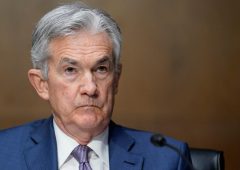Donald Trump Calls Fed Rate Cut a “Political Move,” Criticizes Powell’s Timing
20.09.2024 20:00 2 min. read Alexander Stefanov
Donald Trump criticized the Federal Reserve's recent decision to cut its benchmark interest rate by half a percentage point, calling it a “political maneuver” and suggesting that a smaller reduction would have been more appropriate.
In an interview with Newsmax, Trump remarked, “It really is a political move. Most people thought it was going to be half of that number, which probably would have been the right thing to do. So it’s a political move to try and keep somebody in office, but it’s not gonna work, because the inflation has been so bad.”
He went on to express discontent with Fed Chairman Jerome Powell, claiming he “missed the inflation” indicators. “They missed it. They missed the number. They’re either too early or too late. Now they’re too early. Before they were too late. But inflation is already done,” Trump added.
This half-point cut marks the Federal Reserve’s first reduction in over four years, following a lengthy period of maintaining rates at their highest levels in two decades.
READ MORE:

Will There be Other Rates Cuts by the Fed?
Trump has often criticized the central bank and argued that presidents should have greater sway over its monetary policy decisions, even as traditional practices aim to keep such choices free from political influence. He also stated he would not reappoint Powell as chairman.
These comments came after President Joe Biden described the rate cut as “an important signal” indicating that inflation is easing. He noted, “Lowering interest rates isn’t a declaration of victory. It’s a declaration of progress, to signal we’ve entered a new phase of our economy and our recovery.”
-
1
Key U.S. Economic Events to Watch Next Week
06.07.2025 19:00 2 min. read -
2
Gold Beats U.S. Stock Market Over 25 Years, Even With Dividends Included
13.07.2025 15:00 1 min. read -
3
U.S. Announces Sweeping New Tariffs on 30+ Countries
12.07.2025 16:30 2 min. read -
4
US Inflation Heats Up in June, Fueling Uncertainty Around Fed Cuts
15.07.2025 16:15 2 min. read -
5
U.S. National Debt Surge Could Trigger a Major Crisis, Says Ray Dalio
26.06.2025 10:00 1 min. read
US Inflation Heats Up in June, Fueling Uncertainty Around Fed Cuts
U.S. inflation accelerated in June, dealing a potential setback to expectations of imminent Federal Reserve rate cuts.
Gold Beats U.S. Stock Market Over 25 Years, Even With Dividends Included
In a surprising long-term performance shift, gold has officially outpaced the U.S. stock market over the past 25 years—dividends included.
U.S. Announces Sweeping New Tariffs on 30+ Countries
The United States has rolled out a broad set of new import tariffs this week, targeting over 30 countries and economic blocs in a sharp escalation of its trade protection measures, according to list from WatcherGuru.
Key U.S. Economic Events to Watch Next Week
After a week of record-setting gains in U.S. markets, investors are shifting focus to a quieter yet crucial stretch of macroeconomic developments.
-
1
Key U.S. Economic Events to Watch Next Week
06.07.2025 19:00 2 min. read -
2
Gold Beats U.S. Stock Market Over 25 Years, Even With Dividends Included
13.07.2025 15:00 1 min. read -
3
U.S. Announces Sweeping New Tariffs on 30+ Countries
12.07.2025 16:30 2 min. read -
4
US Inflation Heats Up in June, Fueling Uncertainty Around Fed Cuts
15.07.2025 16:15 2 min. read -
5
U.S. National Debt Surge Could Trigger a Major Crisis, Says Ray Dalio
26.06.2025 10:00 1 min. read

